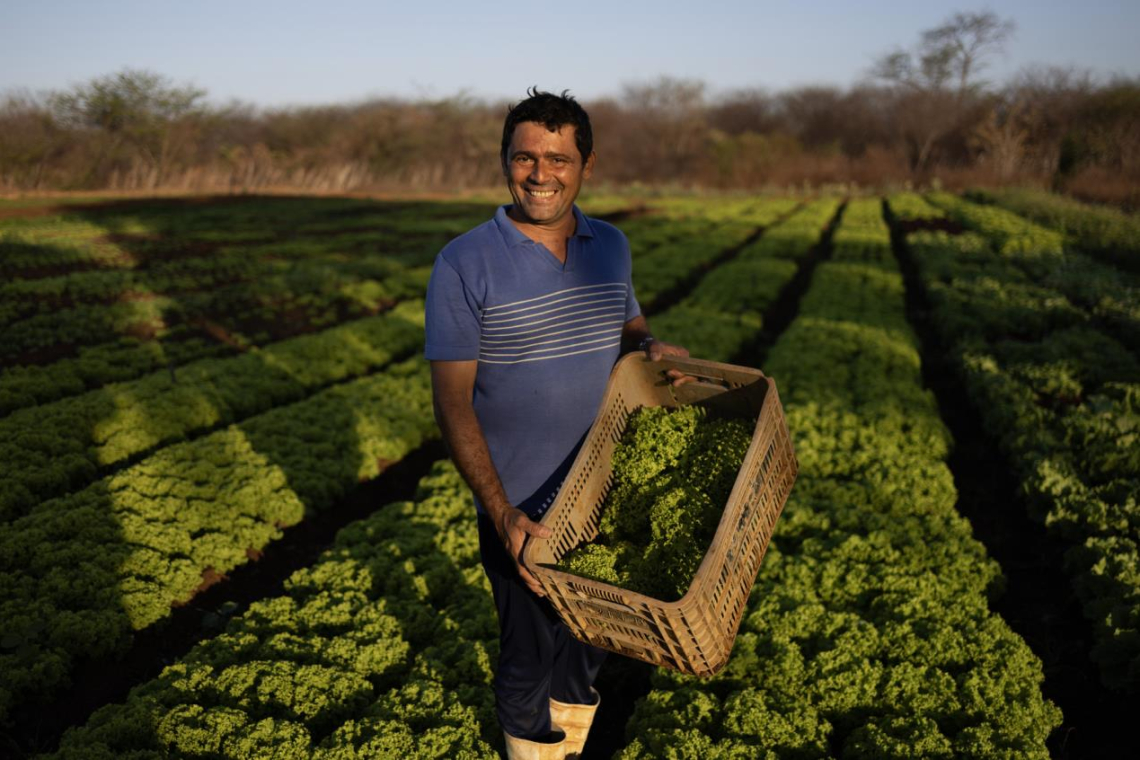Tiago Jose Souza is a producer who has been growing vegetables for 25 years at the small farm Asa Branca in Mossoro, Rio Grande do Norte state, northeastern Brazil. He inspects his lettuce crops every day to verify their adequate growth. Photo credit IFAD/Ueslei Marcelino.
CHAPADA DOS GUIMARÃES, Brazil--The International Fund for Agricultural Development (IFAD) and the Inter-American Institute for Cooperation on Agriculture (IICA) will deepen their joint work, with a focus on sustaining food security in rural areas through investment promotion, the digitisation of agriculture and the strengthening of value chains, according to a press release from IFAD.
This was agreed by IFAD President Álvaro Lario and IICA Director General Manuel Otero through a memorandum of understanding between the two institutions signed on Thursday in the Brazilian state of Mato Grosso, within the framework of the G20 Agriculture Ministers' Meeting – which brings together the countries with the world's largest economies and is considered the largest forum for international cooperation – which this year is chaired by Brazil.
IFAD and IICA have a long history of working together since 1987, when they signed the first agreement with the aim of improving the quality of life of rural people in Latin American and Caribbean (LAC) nations, the release states.
This new agreement creates the framework for the development of projects in priority regions of LAC. IFAD and IICA will promote the exchange of knowledge and ideas in areas such as investment promotion; the use of new information and communication technologies to promote productivity and sustainability; as well as improved access to financing and markets for family farmers.
"We are proud to take the partnership between IFAD and IICA to the next level with the signing of this memorandum of understanding. It is only possible to build resilient rural communities by investing in sustainable agricultural practices and markets that are fair to all farmers, and especially to the smallholders who provide food to most of the world," President Lario emphasised.
"By working together through partnerships like this, we will be able to increase the necessary financing, innovate at scale and reach deep into rural areas, where investments are most needed," he added.
Otero, for his part, stressed that joint work between international organisations and governments, involving the private sector and civil society, is essential to address the challenge of sustaining food security and transforming agriculture, which is currently at the top of the global agenda, according to the release.
The director general of IICA added: "In Latin America and the Caribbean we have 17 million family farmers, who are the backbone of our food security, because they provide 60% of what we eat every day. We have to concentrate our efforts on helping them, and that is what IICA's joint work with an institution as valuable as IFAD points to."
The G20 Agriculture Group was created in 2011 to promote international cooperation to address critical issues, such as production sustainability, food security and adaptation to climate change.
The Ministerial Meeting of the G20 Agriculture Group is headed by Carlos Fávaro, Brazil's Minister of Agriculture and Livestock, and also includes the participation of authorities from the Ministries of Agrarian Development and Family Farming, Foreign Affairs and the Brazilian Agricultural Research Corporation EMBRAPA, in addition to IFAD as the only international financial institution participating in the discussions on agriculture, the release states.
Mato Grosso plays an essential role in the country's dynamic agricultural economy. This state in the centre-west of Brazil is the epicentre of Brazilian production of soybeans, corn and cotton and has the largest national cattle herd.
About IFAD
IFAD is an international financial institution and a specialised agency of the United Nations, the only one that combines rural development financing with technical cooperation. For more than 45 years, it has been working to reduce rural poverty and ensure profitability and food security in the countryside through the mobilisation of funds. It has implemented nearly 200 projects in 28 countries, with a particular focus on women, youth and indigenous peoples, and has invested more than US $24 billion in partnership with governments and private sector engagement, the release concludes.







